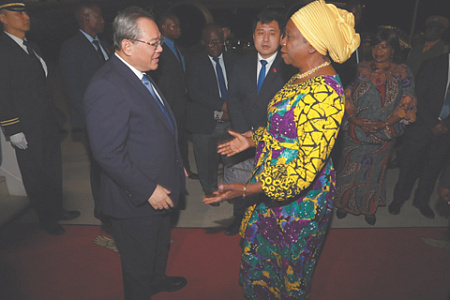
Chinese Premier Li Qiang’s recent diplomatic tour across Africa has underscored the continent’s pivotal role in an intensifying global geopolitical landscape. While ostensibly promoting solidarity among developing nations, Li’s visit, particularly to copper-rich Zambia, has highlighted Beijing’s strategic imperatives: securing vital resources and safeguarding its extensive investments across the continent. This high-stakes engagement sets the stage for even more complex diplomatic maneuvers as he prepares for the upcoming G20 summit in South Africa.
In Zambia, a nation central to the global copper supply, Premier Li Qiang engaged in crucial discussions with local leaders. A cornerstone of his visit was the agreement to modernize a critical railway line, a colossal $1.4 billion project. This ambitious undertaking, facilitated by a Chinese state-owned enterprise, aims to overhaul infrastructure originally built during the Cold War era. Its primary objective transcends mere development; it promises to significantly streamline China’s access to Zambia’s abundant critical minerals, connecting the landlocked nation to the port of Dar es Salaam in Tanzania on Africa’s eastern seaboard.
The railway in question, known as Tazara, was originally inaugurated in the 1970s. Its construction served a vital geopolitical purpose then, providing newly independent African nations with transport links independent of states governed by white minority regimes. Half a century later, this infrastructure once again finds itself at the heart of a global power struggle. A year prior, then-President Joseph Biden of the United States proposed an alternative vision: a new railway connecting Zambia and the Democratic Republic of Congo to the Atlantic coast via Angola. These parallel railway projects, one heading east and the other west, vividly symbolize the burgeoning competition between global giants for Africa’s indispensable mineral resources, crucial for industries ranging from electric vehicles to advanced military technology.
This strategic rivalry underscores Africa’s growing importance in the global supply chain. China has already established a significant foothold, dominating mineral extraction operations in both Zambia and the Democratic Republic of Congo. While the US, under President Trump, has sought to strengthen its supply chains with African nations, particularly in critical minerals, a controversial decision by the former president threatened to undermine American diplomatic efforts and prestige across the continent.
President Trump’s refusal to attend the G20 summit in Johannesburg, citing unsubstantiated claims of persecution against white residents in South Africa, has sent ripples through the international community. This boycott is widely perceived as a diplomatic slight that has significantly diminished global media attention and investor interest in the summit. Li Qiang’s task in South Africa is therefore compounded; he must not only promote China’s consistent and reliable partnership model but also assuage African concerns regarding the perceived volatility of global power dynamics and Western engagement.
Africanist Boris Pilyatskin highlighted the detrimental impact of these developments, noting that such high-level absences detract from the summit’s potential. “The claims regarding white farmers are not entirely clear in their basis, but for Africa, this is a very unpleasant turn,” Pilyatskin observed. With neither the US nor a top Chinese leader attending, and Russia represented by a lower-ranking official, the summit’s strategic importance and potential to attract much-needed investments from developed nations in the West and Asia are severely curtailed.
Despite these setbacks, the South African government, which chaired the G20 for the past year, continues to champion the forum’s role as a vital platform for fostering recommendations beneficial to both developing and developed economies. However, the current geopolitical maneuvering, marked by competing infrastructure projects and diplomatic snubs, casts a long shadow over Africa’s aspirations for greater autonomy, equitable partnerships, and robust investment, even as the continent seeks to assert its growing influence on the world stage.
